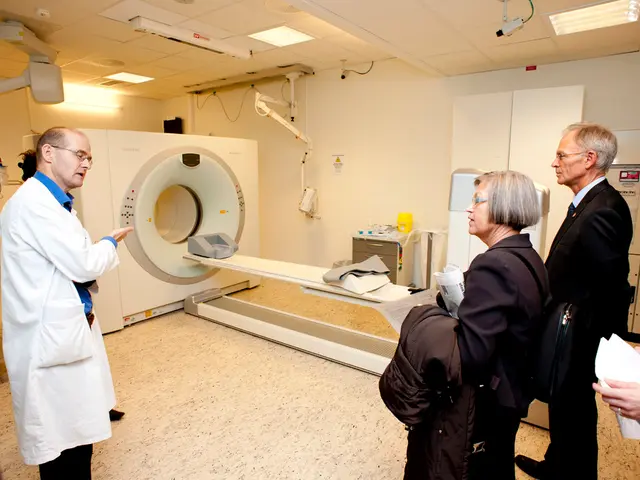Berlin's Mass Killer, Palliativarzt, Faces Imminent Trial
Loose Cannon in the Hospice:
In the heart of Berlin, a shocking tale unfolds as a palliative doctor stands accused of cold-blooded murder. Johannes M., a 40-year-old practitioner, is under heavy scrutiny, with the public prosecutor accusing him of orchestrating the deaths of at least 15 severely ill patients from September 2021 to last July.
The spectacle of justice begins on July 14, 2025, under the presiding eyes of Judge Sylvia Busch. The 21st Large Criminal Chamber prepares for a marathon trial.
Initially, authorities suspected Johannes M. of eight murders back in February. However, their suspicions soon multiplied, leading to the expansion of the case to involve 20 offenses. The alleged victims span various age groups, from 25 to 94 years old.
Police tactics came into sharp focus after receiving a tip from care service workers. Four of their patients died in suspiciously short succession with kitchen fires breaking out in each apartment. The "Pan" investigation team, set up within the homicide department, started their pursuit of the doctor on August 6, 2024, when Johannes M. was arrested and placed in custody.
Investigators delved into patient files, examined further deaths, and exhumed and autopsied 12 bodies of the doctor's patients.
A Deadly Dance of Drugs and Despair
According to the public prosecutor, Johannes M. is said to have administered a fatal concoction of narcotic induction agents and muscle relaxants to his patients without medical necessity, leading to respiratory arrest and death in all charged cases.
This grim series of murders started over three and a half years ago. On September 22, 2021, the doctor is accused of paying a deadly visit to a 25-year-old severely ill woman in her apartment in Berlin-Buckow, ending her life without mercy.
On June 24, 2022, the accused allegedly poisoned a 70-year-old patient in the Goetzstraße, Tempelhof, and subsequently set fire to the apartment to cover his tracks. Despite the prompt arrival of the fire department, neighbors were able to prevent the blaze from engulfing the entire building.
Further alleged crimes followed. In 2022 and 2024, Johannes M. is said to have killed six more patients in various locations across Berlin.
Questions Surround a String of Incidents
Yet, the question remains: Did Johannes M. kill even more patients? As the public prosecutor announced upon indictment, investigations are ongoing in 75 further cases. In 95 cases, an initial suspicion was confirmed, and an investigation was initiated. In five cases, the initial suspicion did not hold up.
It is uncertain whether Johannes M.'s medical past offers any relief. While studying medicine at Goethe University in Frankfurt am Main, the accused completed a thesis on homicide in the city from 1945 to 2008. Subsequently, he moved to Berlin, working in palliative care in Tempelhof and for a home care service based in Kreuzberg.
Gearing up for a lengthy legal ordeal, the court has already scheduled 35 trial days. A verdict might be reached as early as January 28, 2026. The prosecution is demanding a guilty verdict for murder, enhanced penalties, mandatory preventive detention, and a permanent ban on future medical practice.
Throughout this unfolding tragedy, it is the victims' families who bear the brunt of the loss and uncertainty. The pursuit of justice now rests upon the hands of the jurors, who will decide the fate of Johannes M. in the Berlin Regional Court.
- The 21st Large Criminal Chamber, preparing for a marathon trial, will delve into the medical-conditions of the deceased patients as part of the general-news case of the accused palliative doctor, Johannes M.
- During the trial, the court will examine the role of mental-health in the science of medicine, considering whether the defendant's actions were driven by a desire to alleviate the suffering of his patients or if he committed the crimes due to personal reasons.
- Meanwhile, health-and-wellness advocates have called for stricter regulations and oversight in the field of medical practice, to prevent future crimes and ensure the wellbeing of both patients and care providers.








